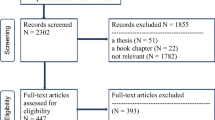Abstract
Participatory Action Research (PAR) is a kind of research that involves participants in the research process and produces knowledge that is useful to service providers, program participants, and other professionals. This article describes an example of PAR conducted by a youth-adult team to evaluate a youth conference based on the philosophy of “youth empowerment.” How participants were included in shaping the research and how researchers collaborated with participants and staff of the program are examined, as well as the specific ways in which the evaluation produced knowledge that was used in the program.
Similar content being viewed by others
References
Argyris, C. (1993).Knowledge for action: A guide to overcoming barriers to organizational change. San Francisco: Jossey-Bass.
Heath, S.B., & McLaughlin, M. (Eds.).Identity and inner city youth. New York: Teachers College Press.
Lave, J., & Wenger, E., (1991).Situated learning: Legitimate peripheral participation. New York: Cambridge University Press.
Lewin, K. (1948).Resolving social conflicts. New York: HarperCollins.
Lewin, K. (1951).Field theory in social science. New York: HarperCollins.
Penuel, W.R. (1994).1994 Peer Institute Evaluation. Report submitted to Prevention Support Services. Boston: The Medical Foundation.
Penuel, W.R. (1995).Communicative processes in cultural identity formation: A mediated action account. Unpublished doctoral dissertation. Worcester, MA: Clark University.
Rogoff, B. (1990).Apprenticeship in thinking: Cognitive development in social context. New York: Oxford University Press.
Rogoff, B. (1994). Developing understanding of the idea of communities of learners.Mind, Culture, and Activity, 2(4), 209–229.
Rogoff, B., Baker-Sennett, J., & Matusov, E. (in press). Considering the concept of planning. In M. Haith, J. Benson, B. Pennington, & R. Roberts (Eds.),Future-oriented processes. Chicago: University of Chicago Press.
Schön, D.A. (1983).The reflective practitioner: How professionals think in action. New York: Basic Books.
Vygotsky, L.S. (1978).Mind in society: The development of higher psychological processes. Trans. M. Cole, V. John-Steiner, & E. Souberman. Cambridge, MA: Harvard University Press.
Vygotsky, L.S. (1987).Thought and language. Trans. A. Kozulin. Cambridge, MA: MIT Press.
Wallerstein, N., & Bernstein, E. (1988). Empowerment education: Freire’s ideas adapted to health education.Health Education Quarterly, 15, 379–394.
Wertsch, J.V. (1991).Voices of the mind: A sociocultural approach to mediated action. Cambridge: Harvard University Press.
Whyte, W.F. (1989). Introduction.American Behavioral Scientist, 32, 502–512.
Whyte, W.F., Greenwood, D.J., & Lazes, P. (1989). Participatory Action Research: Through practice to science in social research.American Behavioral Scientist, 32, 513–551.
Zimmerman, M.A., & Rappaport, J. (1988). Citizen participation, perceived control, and psychological empowerment.American Journal of Community Psychology, 16, 725–750.
Author information
Authors and Affiliations
Additional information
This research was made possible by the Massachusetts Department of Public Health and Prevention Support Services of the Medical Foundation, Boston.
Rights and permissions
About this article
Cite this article
Penuel, W.R., Freeman, T. Participatory action research in youth programming: A theory in use. Child Youth Care Forum 26, 175–185 (1997). https://doi.org/10.1007/BF02589384
Issue Date:
DOI: https://doi.org/10.1007/BF02589384




